Scotland drugs deaths: New record total is 'horrifying and heartbreaking'
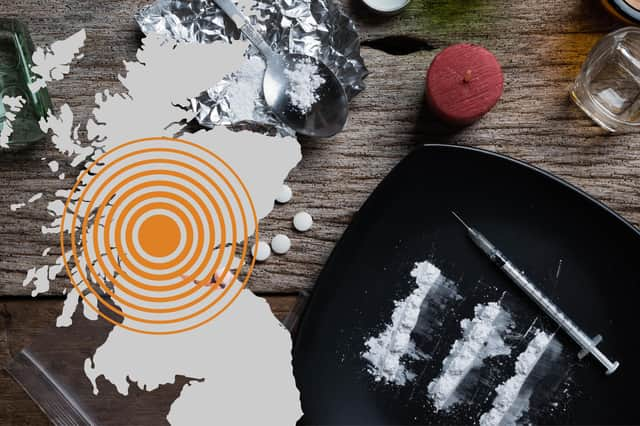

Nicola Sturgeon pledged more action after the figures showed a record increase for the seventh year in a row, with people in the most deprived areas of Scotland 18 times more likely to die from drugs use than in the most affluent.
The statistics by the National Records of Scotland show an increase of five per cent from 2019, and the total is the largest number of drug-related deaths since records began in 1996.
Advertisement
Hide AdAdvertisement
Hide AdDrugs policy minister Angela Constance described the increase as “heart-breaking”, and reiterated the Scottish Government’s “determination” to address the crisis, while the First Minister said: “The number of lives lost to drugs is unacceptable, each one a human tragedy. The Scottish Government does not shirk the responsibility and we are determined to make changes that will save lives.”
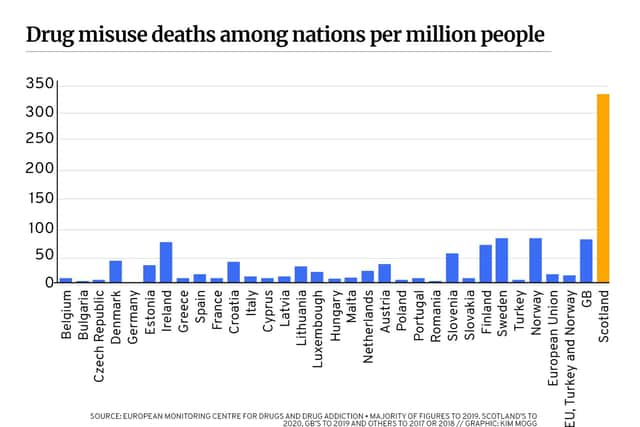

Scottish Conservative leader Douglas Ross – who is set to introduce a Right to Recovery Bill in Parliament – said a “united national effort” was needed to tackle the “national shame", while Scottish Liberal Democrat leadership hopeful, Alex Cole-Hamilton, said the figures were a “scar on the conscience of this Scottish Government."
Deaths top 10,000
During the Holyrood election campaign Nicola Sturgeon admitted that she had taken her “eye off the ball” in relation to drugs deaths, which have now topped more than 10,000 since the SNP was first elected as Scotland’s government in 2007.
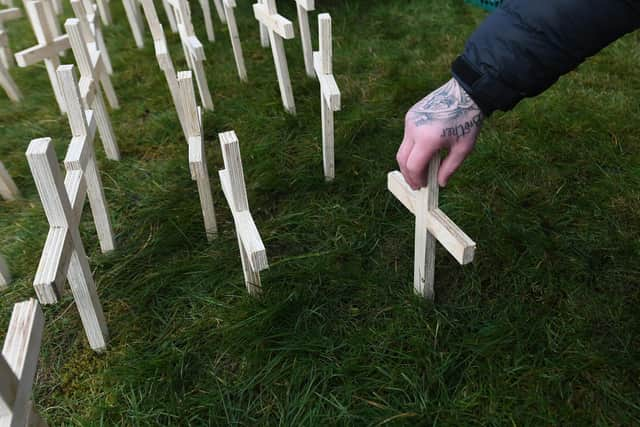

After the 2019 figures were released last December, she sacked her public health minister Joe FitzPatrick, appointed Angela Constance in a new role of drugs policy minister, and committed to spending £250m over the parliamentary term to tackle the crisis. The Drug Deaths Taskforce has since introduced the rollout of naloxone – an anti-overdose drug – and national treatment standards.
‘Horrifying and heartbreaking’
However Mr Ross said the government needed to back his Bill, which is being supported by seven drugs organisations, which would enshrine in law that everyone can access the treatment they need, including a residential rehabilitation place.
He said: “These latest statistics are horrifying and heartbreaking. Behind every number is a lost loved one and a broken family.
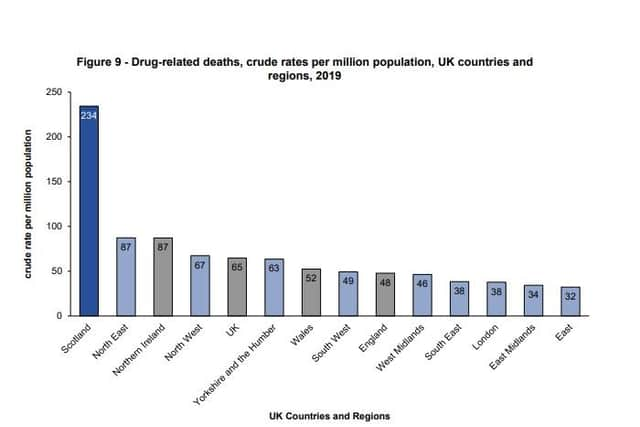

“These shocking figures alone cannot capture the agony, pain and devastation that the drugs crisis is causing in communities across Scotland.
“The drugs crisis is our national shame. It is a stain on Scotland that so many of our most vulnerable people have been left without hope, crushed by a system that is thoroughly broken.
Advertisement
Hide AdAdvertisement
Hide Ad“This is not a day for political posturing but it is a simple fact that the government’s small steps are not cutting it. The crisis is getting worse and spiralling out of control.
“We need a united national effort to make the drastic changes necessary to overhaul the broken system.”
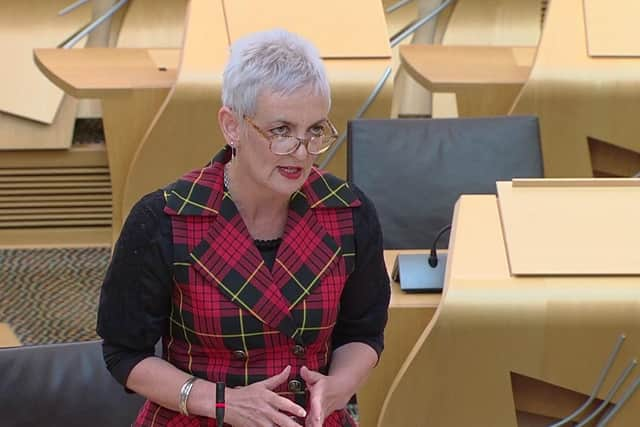

He added: “The Scottish Conservatives are bringing forward a Right to Recovery Bill to guarantee in law that everyone who needs treatment can get it.
“This proposal has the backing of frontline groups and experts across the political spectrum. SNP MSPs are reportedly on board privately. We only need the government to wake up, stop stalling and support it.
“The Scottish Parliament passed Covid laws in three days. We can introduce a Right to Recovery law swiftly if we adopt a similar sense of urgency.
“Overnight, we won’t end this crisis. But we can start on the right path today and take the necessary action now, if the government throws their weight behind this proposal.”
‘Unfolding epidemic’
Mr Cole-Hamilton, who has called for a more radical approach to tackling the issue, said each life lost was a "tragedy".
"This will be a terribly hard day for all those who lost a loved one last year,” he said.
Advertisement
Hide AdAdvertisement
Hide Ad"Every drug death is preventable. However, that task became ten times harder when SNP ministers avoided the subject ahead of the independence referendum, as that justice secretary admitted, and then cut the budget for critical prevention services by 22 per cent.
"Help and expertise that people relied upon was needlessly surrendered when it should have been expanded.
"It was Nicola Sturgeon's choice to ignore this unfolding epidemic. Issuing apologies now is too late for thousands of people. The victims of drugs and their families were failed. It is a scar on the conscience of this Scottish Government."
Scottish Greens health and social care spokesperson Gillian Mackay said the figures were a “tragic reminder of the devastating impact of drug misuse.”
She added: "Every single one of these deaths is a preventable tragedy.
“The approach to drugs, pursued by both the UK and Scottish governments, must change. The war on drugs has demonstrably failed, it’s long past time we treated this crisis as the public health emergency that it is. It is time for an approach which focuses on restoring people’s dignity and treating their addiction, rather than criminalising them.
“While long term plans are now being developed to tackle this crisis, they come far too late for many. And for those in crisis now, they need to see urgent action, not more empty words.”
Dr Rebecca Lawrence, chair of the Addictions Faculty at the Royal College of Psychiatrists in Scotland, said it was “shameful” that Scotland was known as the drug death capital of Europe.
Advertisement
Hide AdAdvertisement
Hide Ad"Drug-related deaths continue to spiral out of control, shattering the lives of those individuals and communities left behind,” she said.
“The pandemic hasn’t helped and while we acknowledge the work that’s already been done, we need to focus on a full range of treatments, both harm reduction and recovery-based, being available to all.
“When people ask for help, nobody should be turned away, neither young people or older adults who are more vulnerable to physical illness, often due to years of smoking.
“Rehabilitation should always be there at the right time, for the right individuals. Other facilities like safe consumption rooms may also help those who can’t stop injecting, but one size does not fit all and fully resourced community services with rapid access for all patients, must be provided.”
And Professor Roy Robertson, Fellow of the Royal College of Physicians of Edinburgh, said: “It is deeply saddening to see another rise in the number of people who have lost their lives because of drugs. Our thoughts are with their friends and family at this difficult time.
“We published a report in March, which suggested key interventions that can be taken now. This includes the introduction of safe consumption facilities. And we want work to begin on designing a heroin-assisted treatment programme in all major centres in Scotland, after a largely successful pilot scheme in Glasgow.
"We hope to see the Scottish Government and UK Government work closely together to design and introduce these policies, which we think can make a real difference for people who use drugs.”
Ms Constance said the statistics were “heart-breaking” and offered her “sincere condolences" to the families who had lost a loved one through drug use.
Advertisement
Hide AdAdvertisement
Hide AdShe added: “We need to gather as much information as we can about drug use in Scotland and to that end, data on suspected drug deaths will be published quarterly from this September. This will ensure we can react more quickly and effectively to this crisis and identify any emerging trends.
“We are working hard to get more people into the treatment that works for them as quickly as possible. Without treatment, there is little hope of recovery so we are funding as many community and third sector initiatives as we can so that individuals have the widest possible choice and can opt for the support which suits them and their family.
“Of the £250 million announced over the next five years, £100 million will go on improving the provision of residential rehabilitation and I will update Parliament on progress in this area after the summer recess.
“As I have said before, I am determined that every penny of this additional funding will make a difference to all those affected by drug use in Scotland.”
Drug Deaths Taskforce Chair Professor Catriona Matheson said the "causes of, and the solutions to, the challenge we all face are complex” and added: “At its heart are real people at real risk, and we continue to be determined to make difference for them.”
Lothians & Edinburgh Abstinence Programme Clinical Lead Dr David McCartney said: “All of us who work in addiction treatment are appalled at the high level of drug-related deaths in Scotland.
"Having a wide range of treatment options that are holistic, reduce harm, promote recovery and are integrated into a recovery oriented system of care is essential to address the crisis. I welcome the Scottish Government’s investment in residential rehabilitation treatment as part of the wider approach under the National Mission.”
And Andrew Horne, director of the drug, alcohol and mental health charity With You, said: "We have a mountain to climb to reverse these alarming figures but with the recently strengthened commitment and decisive action now being taken, we are hopeful that change is possible.”
A message from the Editor:Thank you for reading this article. We're more reliant on your support than ever as the shift in consumer habits brought about by Coronavirus impacts our advertisers.
If you haven't already, please consider supporting our trusted, fact-checked journalism by taking out a digital subscription.
Comments
Want to join the conversation? Please or to comment on this article.
